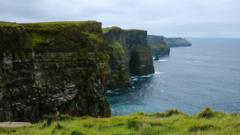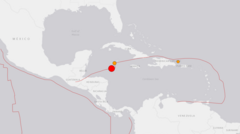A tourist's close encounter with a shark while on vacation in Turks and Caicos resulted in her being bitten and subsequently flown to a hospital for care.
Shark Bite Incident in Turks and Caicos Highlights Risks of Close Encounters

Shark Bite Incident in Turks and Caicos Highlights Risks of Close Encounters
A female tourist was injured while attempting to take photos with a shark off Providenciales, requiring medical evacuation for treatment.
The incident occurred on February 7 at a beach in Providenciales, a popular destination known for water activities. The unidentified woman was reportedly trying to take pictures of a six-foot-long shark when the bite happened. The local Department of Environment and Coastal Resources indicated that the beach was temporarily closed following the incident but was reopened two days later once the shark had moved to deeper waters.
While details about her injuries remain undisclosed, it's important to note that shark bites are incredibly rare and are often accidental. Experts emphasize that sharks may mistake objects like cameras for prey. In fact, throughout the past year, only 88 verified shark bites occurred globally, with 24 categorized as provoked incidents like the one in Turks and Caicos.
Conservationist Chris Stefanou highlighted the risks involved when attempting to photograph sharks, suggesting that the shark may have interpreted the woman’s phone as bait. This particular incident was not an isolated case, as two Americans were also injured in a separate shark encounter on the same day in the Bahamas, prompting experts to evaluate if there might be a concerning trend. Nonetheless, data indicate a decrease in the number of unprovoked shark bites in recent years.
Despite these incidents, sharks remain a significant yet misunderstood part of marine ecosystems, with many bites resulting from unintentional interactions.
While details about her injuries remain undisclosed, it's important to note that shark bites are incredibly rare and are often accidental. Experts emphasize that sharks may mistake objects like cameras for prey. In fact, throughout the past year, only 88 verified shark bites occurred globally, with 24 categorized as provoked incidents like the one in Turks and Caicos.
Conservationist Chris Stefanou highlighted the risks involved when attempting to photograph sharks, suggesting that the shark may have interpreted the woman’s phone as bait. This particular incident was not an isolated case, as two Americans were also injured in a separate shark encounter on the same day in the Bahamas, prompting experts to evaluate if there might be a concerning trend. Nonetheless, data indicate a decrease in the number of unprovoked shark bites in recent years.
Despite these incidents, sharks remain a significant yet misunderstood part of marine ecosystems, with many bites resulting from unintentional interactions.






















